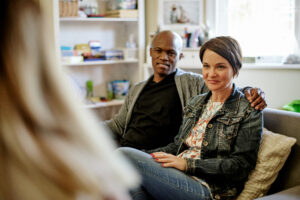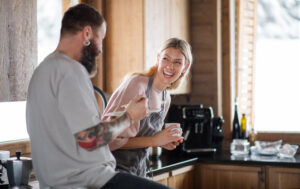What is positive psychology and how is it something that can help you and your relationship? Well hopefully I can help answer this by giving you a crash course in positive psychology and sharing my insights and learnings from a recent conference I attended on Positive Psychology.
Shahn and I attended the European Conference on Positive Psychology in Innsbruck, Austria in July 2024. The conference was packed full of psychologists, coaches and researchers from across the globe, spanning 4 days and offered well over 200 workshops, keynotes, and presentations. So obviously, we were not able to see everything this conference had to offer. But I did get to sample some interesting topics and ideas.
What is positive psychology?
Positive psychology is a particular branch of psychology (founded by Martin Seligmann) that focuses on positive human functioning and flourishing across multiple levels of life.
I’ll pause here to explain the term “flourishing” as it is at the heart of positive psychology. Flourishing is a state in which you experience positive emotions, meaning, engagement, positive relationships, and accomplishment. Flourishing represents optimal well-being and functioning, where you not only feel good but also function effectively and meaningfully in your life. Flourishing is a life well-lived, and so is the ultimate goal of positive psychology.
Positive psychology aims for a person to flourish across many dimensions in life, including the biological, personal, relational, institutional, cultural, and global dimensions of life. It’s a little different to traditional psychology which tends to focus more on mental illness and dysfunction. Rather, positive psychology aims to understand and promote factors that allow individuals and communities to thrive.
There’s a nice acronym, PERMAH, that highlights the key factors that need to be understood and addressed to create a flourishing life:
- Positive Emotions
- Engagement
- Relationships
- Meaning
- Accomplishment
- Health
The Power of Positive Emotions
I’m a Clinical Psychologist, so you’d think my mind wouldn’t be blown by the idea that positive emotions have an essential role in living a good life. But, you know what, I think I spend so much time focusing on vulnerabilities and taking care of those, I sometimes miss the simple and essential role of positive emotions and how sometimes we do have the power to shift our emotional state to a more positive one.
Therefore, one of my key learnings from the conference is that we can increase positive emotions in the moment. We can do this with the consistent effort to eat well, exercise regularly and get enough sleep. But also, in the moment we can do things that effectively release mood-enhancing neurotransmitters and make us feel better. This could be moving our bodies with dance, getting our heart rate up by running up the stairs, hugging a loved one or a pet, laughing, listening to a favourite song, finding beauty in something around us, or by getting out in nature.
I’m sure you’ve heard these before, but I encourage you to give them a go with intention and wholeheartedness. While recently traveling, I utilised this strategy whenever I felt sluggish, down or detached and found it to be helpful.
Do you flow?
Have you heard of flow? Even if you haven’t heard of the term, I’m sure you’ve experienced it. Flow is a psychological state in which you become fully immersed and engaged in an activity, experiencing a sense of timelessness, focus, and enjoyment. Coined by psychologist Mihaly Csikszentmihalyi, flow occurs when your skills are well-matched to the challenge at hand, leading to a feeling of effortless action and deep concentration. This state enhances creativity, productivity, and satisfaction.
While in a flow state your brain releases a number of neurotransmitters (dopamine, norephedrine, anandamide and serotonin) to allow you to feel amazing.
That makes me think we all need to be prioritising activities that enable us to experience flow. An important note here is that to get the most out of flow, it needs to be meaningful. So although gaming, playing candy crush or watching videos on social media might be a version of flow, they are actually “junk flow”, as these activities don’t provide meaning. Rather the focus needs to be on meaningful flow. This might be different for each person. It could simply be dancing to your favourite song in the kitchen, rock climbing, running, creating art, and so on.
When were you last out in nature?
This is an absolute favourite of mine. There is so much research now showing that nature and well-being is intricately connected. The explanations for why nature is so important to our well-being are super interesting, from the idea that there is a coherence and consistency to nature that just makes sense (e.g., the sun rises in the east and sets in the west everyday and the reliable ever-changing of the seasons), to the idea that nature offers something bigger than ourselves that we fit into.
A curious fact I learnt from a presentation on nature and wellbeing, was that although both wild nature and parklands are essential for well-being, parklands particularly, saw a more significant effect. This might be due to accessibility, it’s much harder to access hiking, or it could be the social connection available in parklands. Either way, if you live near a park, it’s in your best interest to get out there.
Finally, the role of nature in our well-being really highlights the importance of sustainability. Given nature’s gift to us to increase our happiness and meaning, we need to be doing everything we can to look after it and ensure future generations get access to nature.
Are you resilient?
Finally a quick word on resilience. Being such a buzz word, I wanted to share some insights I gleaned about this concept from a particular speaker I heard, author Michael Unger. He explained resilience to be the navigation and negotiation of resources. Rather than being a trait we have or may not have within ourselves, resilience is the capacity to access resources in the environment around us.
When stress is low, resilience is more about your internal capacity to cope. So low stress means you can rely on your internal resources to survive. But in high stress resilience it is really about accessing the resources and support you need from the environment around you. So high stress means you MUST be able to access and negotiate supports from around you, to survive. So if you are in an environment with high stress and very low resources it’s going to be harder to survive.
I think this is a really important concept as it shifts resilience away from a trait within ourselves to really about accessing opportunities around us. When we think of building our own, our loved ones or our children’s resilience, it’s not just about finding the inner strength to cope, but most importantly it’s about learning how to effectively seek out the opportunities for support and assistance from the surrounding environment.
How do relationships fit in?
Relationships are a wellspring for flourishing. Actually, let me rephrase that: Healthy relationships are a wellspring for flourishing. You have the opportunity to improve your partner’s mental and physical wellbeing, and vice versa.
A healthy partnership provides countless opportunities to engage with your partner in a positive way to get those key mood-enhancing neurotransmitters firing (and let’s not forget Oxytocin here!). Whether that’s by connecting with your partner in nature, singing and dancing together, cuddling or laughing together. Who doesn’t want those feel-good moments? And finally, your partner is a source of support and care. A healthy relationship provides resources in your environment you can access in times of stress.
I hope you can take something positive away from this and take a step to improve your wellbeing and hopefully your relationship.
Helen




